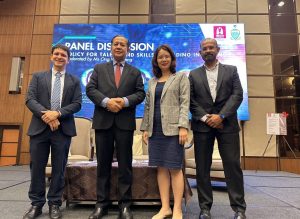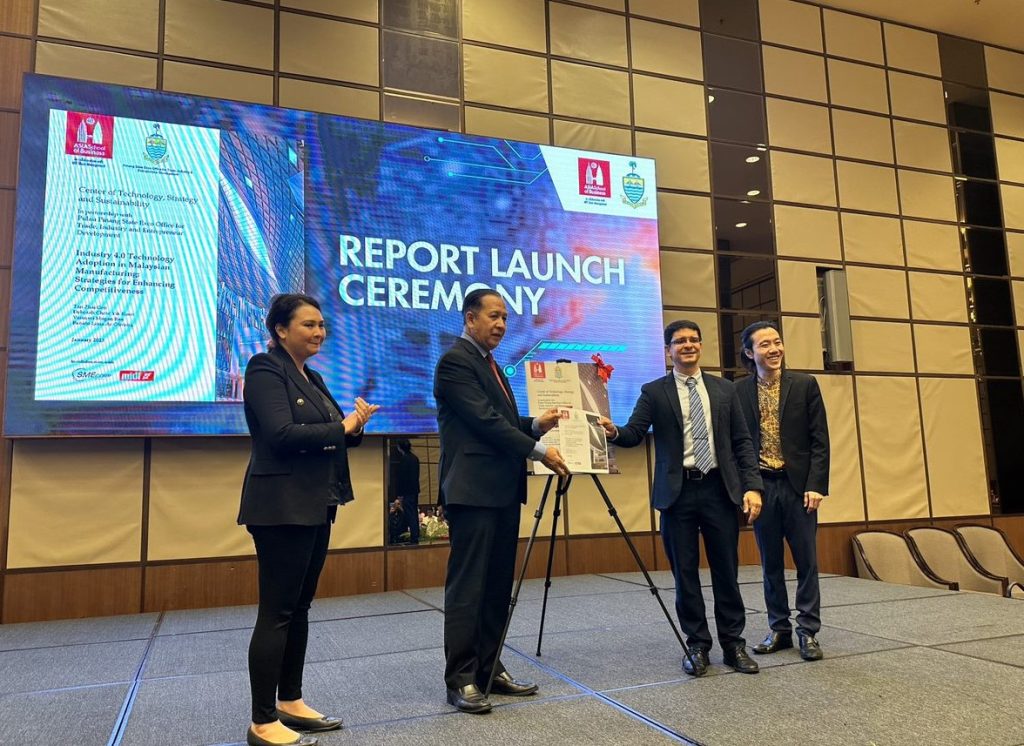Key Takeaways
- The Center of Technology, Strategy and Sustainability of the Asia School of Business launched the “Industry 4.0 Technology Adoption in Malaysian Manufacturing:
Strategies for Enhancing Competitiveness” report with the support of the Penang State Government on the 10th of February, 2023. - The report found that while firms adopt IR 4.0 to improve productivity and quality, the availability of talent, skills and continuous training remains the biggest challenge to IR4.0 adoption.
- The report suggested that in the short-term, efforts for continuous talent training and upskilling should be enhanced, including strengthening the technical and
vocational education system. In the mid-term, the state should develop incentives that match the entrepreneurial discovery of new activities. In the long-term,
Malaysia needs a new industrial policy to chart a way out of premature deindustrialisation.
Penang, 10 February 2023 – The Center of Technology, Strategy and Sustainability of the Asia School of Business launched the “Industry 4.0 Technology Adoption in Malaysian Manufacturing: Strategies for Enhancing Competitiveness” report with the support of the Penang State Government on the 10th of February, 2023 at The Wembley – A St Giles Hotel, Georgetown, Pulau Pinang. The report launch was attended by policymakers, researchers, academia and the private sector.
The launch was opened by Dato’ Abdul Halim Hussain, Exco for Trade, Industry & Entrepreneur Development, where he welcomed the participants and emphasized on how Industry 4.0 technology adoption is an opportunity for the Malaysian and Pulau Pinang manufacturing sector to move up the global value chain. He stated that his office is exploring public-private partnerships to set up a R&D centre for the benefit of local SMEs.
Dr Tim Sturgeon from the Industry Performance Center (IPC) at the Massachusetts Institute of Technology (MIT) introduced the Work of the Future – Global Research Network research, where this research report is part of the broader collaboration with researchers and universities in Turkey and Brazil to understand technology adoption in emerging economies.
This is followed by the presentation by one of the authors, Dr. Renato Lima de Oliveira, Assistant Professor and Faculty Director of the Center of Technology, Strategy and Sustainability of the Asia School of Business. Professor Renato presented the key findings from the research project. The key findings are as below:
- Firms adopt IR4.0 technology to improve productivity and quality, and rely on close collaboration with local technology suppliers.
- Workers are generally receptive to IR 4.0 technologies, as it improves the quality of their work.
- While several successful industry-led training initiatives have been launched, the availability of talent, skills and continuous training remains the biggest challenge to IR 4.0 technology adoption in Malaysia.
- Firms need to work closely together with governments, especially in the area of skills and training, both to upskill current workers, and to ensure new workers have the right educational foundation.
Dr Renato also shared three policy recommendations for IR4.0 technology adoption in the manufacturing sector
- In the short-term, efforts for continuous talent training and upskilling should be enhanced, including strengthening the technical and vocational education system,
such as partnerships with the private sector through government-led programs, and the formation of community talent-sharing. - In the middle-term, the state should develop incentives that match the entrepreneurial discovery of new activities. This may not require large subsidies,
instead incentives which can help companies innovate along the way. - In the long-term, Malaysia needs a new industrial policy to chart a way out of premature deindustrialisation, aiming at the diversification of sectors and jobs in the
economy and creating spaces for entrepreneurs.

The launch ended with a discussion panel on ”Policy for Talent and Skills Upgrading in Penang”. The panel was moderated by Ms Ong Wooi Leng from the Penang Institute, together with Professor Renato and Dato Dr. Shanmuganathan Palanisamy, CEO of Kontron Malaysia . The discussion talked about the importance of skills training and what can be done to assist the manufacturing sector in providing the skills needed. The event ended at 1pm.
About Asia School of Business
Challenge conventional thinking and create change beyond business. Established in 2015 by Bank Negara Malaysia in collaboration with MIT Sloan School of Management (MIT Sloan), Asia School of Business (ASB) is committed to developing transformative and principled leaders who will create a positive impact in the emerging world and beyond.
ASB offers postgraduate courses (including Asia’s only Master of Central Banking) as well as corporate programmes designed for busy professionals to upskill themselves with short, accelerated courses. Each course is self-contained and crafted to provide leaders with the essential knowledge, skills & tools to navigate in today’s complex world. To learn more about Asia School of Business, visit their website, or check out their LinkedIn, Instagram and Facebook pages.
About Center of Technology, Strategy and Sustainability
The Center of Technology, Strategy & Sustainability (CTSS) is a research center housed at Asia School of Business (ASB) in Kuala Lumpur, Malaysia. The Center of Technology, Strategy& Sustainability is endowed by Sapura Energy, and aims to be a leading center of excellence and research on business strategies and technology in emerging markets and their socio-political environment.
To learn more about the Center of Technology, Strategy and Sustainability at the Asia School of Business, visit their website, or check out their LinkedIn and Twitter pages.





